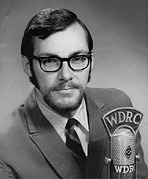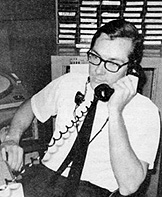
©
2005-2025
Man From Mars Productions
|
Stephen
Kane
|
 |
|
|
|
Okay… It's 1968 and the world is in turmoil. The intensifying cold war makes an interesting counterpoint to a long, hot summer filled with racial riots (including Hartford). Vietnam dominates the political landscape and the country is reeling from the assassinations of MLK/RFK. It's August and America has just watched Chicago police beating young demonstrators senseless on live TV during the Democratic convention. Where is Stephen Capen working (before Hartford) and what leads you to relocate? I was doing the morning show at WAAB in Worcester, my very first stint in rock & roll radio and in a metropolitan market. My first air name, in fact, Stephen Kane. A lot of firsts. Best of all I was given plenty of latitude. At this point I was so engrossed in my new work I was completely oblivious to the upheaval going on across the country and indeed in radio. A progressive music show -- Cream, The Doors, The Mothers of Invention -- premiered at night hosted by Jeff Starr while we continued our Ron Landryesque comedy in the A.M. It seems that just like almost all of my gigs the good times weren't to last. Atlantic Records bought the station, and you'd think that would be a good thing, but in came the consultants from New York and Washington, the air sound was tightened beyond belief, catchy new jingles added, and it wasn't long before their newly-installed PD, Sebastian Tripp, gave me my walking papers. I admired that glossy, clipped, clean sound of a WRKO, but I was raised on personality radio such as WMEX with Woo Woo, Melvin X. Melvin and Mel Miller, and WBZ with Dick Summer, Bruce Bradley and especially Jefferson Kaye, who I interned with one summer. When I was even younger I really was intrigued with Joe Smith and a hilarious funnyman on WCOP whose name has slipped through the sizable cracks in my memory. |
|
|
I'd become the Music Director just before I left and I can't recall exactly, but I'm sure it was a good relationship with the record promo guys like Al Coury and Lenny Pietze who hooked me up with Charlie Parker. It wasn't long before I auditioned and Charlie, being a compulsive card, liked what he heard and to my delight hired me for mid-days on Big D FM. WDRC is also in some turmoil in 1968. Joey Reynolds, Sandy Beach and Joe Barbarette, all mainstays of the personality era have just departed. The only remaining veterans are Dick Robinson and Ken Griffin (though Kent Clark and Brad Field have both been on board for a year). In what direction was Charlie Parker steering the ship? Charlie was a master at riding the waves. There was fierce competition from WPOP, who had adopted that RKO sort of format, there was a lot of uneasiness within the station, and air personalities were coming and going. Al Gates was there for a New York minute then off he went to WINF. Larry Justice popped in for a few weeks then back he went to Boston. I'm sure Charlie was frustrated with this sort of action. On top of it Jim Jeffrey was shuffled around and Brad Field was as well. Maybe something was in the wind. Joey and Sandy went off to the majors, and I only knew them by reputation, and they had big ones. Despite it all, Charlie wanted DRC to retain its position as a strong personality rocker that broke records nationally. A real rock & roll radio station with a formidable news department, and that was much more than a jukebox. There is also a change in upper management as 1968 turned into 1969. Bill Crawford and Mike Boudreau give way to GM Dick Korsen, a man many people have commented negatively about. The whole picture changed when Korsen arrived. My recollection is he was a crony of Buckley Jr. or some such and knew nothing about radio, had no love for radio as an entertainment medium, and the resentment was immediate and widespread. He proved it warranted by a pretty ruthless management style. |
 |
Your primary assignment was on WDRC FM. Yet Charlie was clearly experimenting with odd shifts (you and Dick McDonough both did first shows in an unusual 7-11PM weeknight shift; for a while Kent Clark did 6A-12N on FM; even newsman Bob Walker did a Sunday night music shift). When you were hired was there a clear game plan in evidence? No, like I say, Big D was in heavy flux. There was friendly competition for the slots, say, between McDonough and I, and not-so-friendly contests. A lot was up for grabs. |


